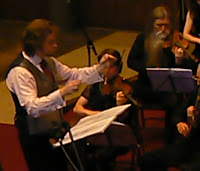The Power of the Conductor
 Several months ago I had the great pleasure of conducting the premiere performance of my 'Symphony No 1, Figuratively Speaking.' The performance was well received even if the recording of it shows the performance to be lukewarm at best. You might think, as composer, that I'd know the work better than anyone else - and, as a new work, you're probably right. No matter how well I knew the piece, I was still amazed at how much I learned about the music during the process of rehearsing/conducting it, so the conductor obviously has a different vantage point of the music than the composer. Some of the players in the orchestra gave me glowing marks for my performance - and yet, I am still an amateur conductor and (IMHO) the performance showed it.
Several months ago I had the great pleasure of conducting the premiere performance of my 'Symphony No 1, Figuratively Speaking.' The performance was well received even if the recording of it shows the performance to be lukewarm at best. You might think, as composer, that I'd know the work better than anyone else - and, as a new work, you're probably right. No matter how well I knew the piece, I was still amazed at how much I learned about the music during the process of rehearsing/conducting it, so the conductor obviously has a different vantage point of the music than the composer. Some of the players in the orchestra gave me glowing marks for my performance - and yet, I am still an amateur conductor and (IMHO) the performance showed it.
The Edinburgh Symphony Orchestra has performed numerous other concerts, tackling some very difficult music. Not all the concerts are amazing, but certainly the orchestra, for being a subscription ensemble, can be proud of the performances they give. They do an admirable job, and with a good conductor they do even better. Under the current musical direction of Gerard Doherty the performances continue to be strong, reliably competent, something the orchestra should take pride in.
In a performance of 'a child of our time' last August by the BBC Scottish Symphony and the Edinburgh Festival Chorus, Gennadi Rozhdestvensky gave a tired performance. Another Edinburgh Festival Performance, "The Enchanted Wanderer" as performed by Mariinsky Opera and Orchestra under the baton of Valery Gergiev was better, but still lacked that amazing quality we hope to experience in a professional concert. Both of these performances had moments, but both also had problems, problems I feel could have been corrected by the conductor. Both of these conductors have other concerts which have achieved that sense of amazing, so it was possible; it just didn't happen on the nights I attended.
 The conductor Seiji Ozawa (pictured) recently conducted a performance of Tchaikovsky’s “Queen of Spades” by the Metropolitan Opera. Anthony Tommasini was not impressed with the vocalists (one had a cold, another was too loud and one was lacking emotion). He wa however very impressed with Ozawa's conducting, 'the greatness of Tchaikovsky’s 1890 opera, adapted from a Pushkin short story, came through vividly. Much of the credit goes to the conductor Seiji Ozawa. Mr. Ozawa drew a splendid performance of “The Queen of Spades” from the Met Orchestra, richly colored yet clear-textured, urgent yet pliant, expressive without being sentimental.'
The conductor Seiji Ozawa (pictured) recently conducted a performance of Tchaikovsky’s “Queen of Spades” by the Metropolitan Opera. Anthony Tommasini was not impressed with the vocalists (one had a cold, another was too loud and one was lacking emotion). He wa however very impressed with Ozawa's conducting, 'the greatness of Tchaikovsky’s 1890 opera, adapted from a Pushkin short story, came through vividly. Much of the credit goes to the conductor Seiji Ozawa. Mr. Ozawa drew a splendid performance of “The Queen of Spades” from the Met Orchestra, richly colored yet clear-textured, urgent yet pliant, expressive without being sentimental.'
Looking back at BBC's Maestro where some non-musicians got the chance to learn conducting and actually conduct the BBC Orchestra, there was an dramatic difference between the various conductors and corresponding performances of the orchestra. This was particularly illuminating because the orchestra was the same for each performance and yet, the disparity between quality of the performance was noticeable. As the weeks progress and the conductors learned more about the craft, the performances also grew in quality.
I will take conducting classes as part of my Masters studies because this is an aspect I want to know more about - the way a conductor communicates with an ensemble and how that communication reflects the music on the written page. It is not enough to just put black spots on a white page; as a composers I must also be aware as to how those spots translate into music and the endless range of possibilities a conductor might bring to them. The better I know this, the better I will be able to write music that even amateur conductors will be able to have a solid performance. My symphony's performance last June was solid, competitent. Part of that was due to the orchestra, part of that was due to the conducting and part of that was due to the music. Eventually I will conduct professional orchestras; when I do the music and conducting needs to step up to the task as well.

Comments